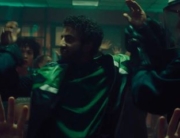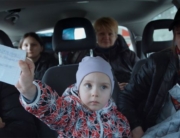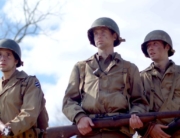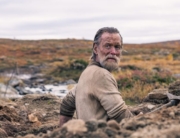Aftermath, an intense thriller, exposes the corrosive effect of collective silence and lies over decades. The people of Poland spent much of the 20th century conforming to official fictions, from occupation by the Soviets and the Nazis, and then under Communist control and the nationalism released by democracy. Writer/director Wladyslaw Pasikowski dug through some of this complex amnesia with director Andrzej Wajda as his co-writer of Katyn (2007). Here, he blows up the image Poles have of themselves as victims and heroes of forces larger than themselves. The pin in his grenade is persistent Polish anti-Semitism.
Franek Kalina (Ireneusz Czop, the immigrant father in Shane Meadows’s 2008 Somers Town) travels a lengthy route to get back to his isolated home village in central Poland—taking a plane from Chicago, a taxi to a bus ride through beautiful pastoral acres, and a long walk into dark woods out of the Grimm’s tales. Locals are quick to mock him as the prodigal, Americanized son who didn’t attend his parents’ funerals after he left 20 years earlier. While they joke that he must be living an easy life, he grumbles about “the Yids” who control Chicago construction and who have relegated him to the worst kind of work.
He’s come all this way to confront his blond younger brother Jozek (Maciej Stuhr), whose wife and children landed on Franek’s doorstep in Chicago—she refuses to return. Jozek has his own resentments from struggling to maintain the family farm. While the brothers argue and grudgingly do the necessary heavy chores together around the farm, Jozek figures he can at least get his brother to co-sign a bank loan. But under the ever watchful eyes and jibes of the townspeople (shades of John Sturges’s 1955 Bad Day at Black Rock), Franek finds that something has changed, and it’s his brother who has riled things up. The bank claims there’s a problem with their property title and Jozek gets beat up by thugs from the nearby sawmill. (Wajda Pawel Edelman’s dramatic cinematography keeps contrasting lovely landscapes with nasty doings.)
Jozek confesses an obsession that has driven away his wife and riven him from his neighbors: A major flood in 1998 shifted the ground and roads to uncover the 1950’s practice of using gravestones from the former Jewish cemetery as construction filler in streets, foundations, and walls. (Zuzanna Solakiewicz’s 2011 documentary Yorzeit showed this in a real such village.) He has been systematically tearing them out, plus buying them up from whoever would sell to him, with the help of the retiring priest, who can’t bring himself to preach about it, what with the disapproval of his incoming replacement. Jozek has set aside a field on the farm to replant and clean the tombstones, even learning Hebrew to decode names for family groupings he presumes were decimated by the Nazis. (Stuhr’s touching role, and his promotional commitment, in contrast to his comic persona on Polish TV, was the focus of negative homegrown reaction to the film.)
Franek is flabbergasted at this memorial for people from the past he doesn’t care about (to say the least), but he’s even more shocked by the escalating retaliations—the graffiti, the threatening surveillance, and soon worse (much, much worse). Jozek is almost resigned to martyrdom in sympathy with the ghosts who haunt him, but when Franek, on a tractor, gets chased off a narrow road by a car, that makes him angry and, in a reversal between the two brothers, spurs him to investigate.
Surprisingly, the past is not all that hard to dig up if someone wants to, both through the paper trail in the town archives that clearly shows property lines were changed before Communist agrarian reforms in 1945, and through family ties—everyone knows Franek from his childhood escapades. Though it’s admirable that the tension and suspense are not sidetracked by Hollywood-style romance with the ruggedly handsome Franek and a pretty doctor, granddaughter of a taunter in the village square, it’s a bit too detective-story pat to have the horrible truth pushed out in sad and spiteful monologues. First, a seemingly crazy old witch (Danuta Szaflarska) wafts out of the woods as an accusatory eyewitness, and then the intimately personal revelations are boomeranged back to the Kalinas by a snarling reclusive codger. (Ninety-two-year-old actor Robert Rogalski is scarily authentic in personifying the dark face of rural Poland).
The controversy set off from the publication of historian Jan T. Gross’s 2001 book Neighbors: The Destruction of the Jewish Community in Jedwabne, documenting publicly known events in a real village, inspired this film, and the country’s ongoing sensitivity about what went on during World War II was noticeable last year when President Obama had to apologize over using the phrase “a Polish death camp” in a ceremony honoring a resistance hero. Margarethe von Trotta’s recent Hannah Arendt featured the angry reaction to Arendt’s cold analysis of Jewish faults during the Holocaust, but not how she put their odds within the context of each occupied nation’s anti-Semitism—even she didn’t blame the Polish Jews for their fate. Aftermath devastatingly proves her right by lifting the veil from an awful conspiracy of silence.







Leave A Comment